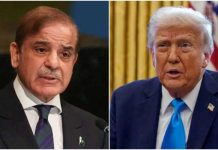——– Khuhro alleges MQM-P promoting division between rural and urban Sindh through provocative banners in Karachi
From Zeeshan Mirza
KARACHI: The Pakistan Peoples Party (PPP) has accused the Muttahida Qaumi Movement-Pakistan (MQM-P) of conspiring to divide Sindh by creating maps of Jinnahpur in the past. This allegation was made by PPP Sindh President Nisar Khuhro in response to a press conference held by MQM-Pakistan.
Khuhro called on the Pakistan Muslim League-Nawaz (PML-N) to reveal the details of any secret agreements made with MQM-P regarding the appointment of the Sindh governor.
“The whole world knows that the Jinnahpur maps were seized from the old MQM, which MQM-Pakistan is a continuation of,” Khuhro stated. He accused MQM-P of promoting division between rural and urban Sindh through provocative banners in Karachi.
Khuhro criticised MQM-P’s demand for a separate secretariat, labelling it as a bid to divide Sindh. He also highlighted MQM-P’s historical support for the quota system, noting that they backed it during the regimes of Pervez Musharraf, Imran Khan, and PML-N, and never opposed it in the past.
Khuhro questioned why MQM-P is now vocal against the quota system while being part of the current PML-N federal government, yet silent on this issue in previous coalitions.
“Jobs in Sindh are the right of all residents of the province, including Urdu speakers,” he asserted. He accused MQM-P of perpetuating the politics of hate and division initiated during the regimes of Musharraf and Ziaul Haq.
Khuhro demanded that PML-N disclose any agreements with MQM-P concerning the governorship of Sindh, as per the PPP and PML-N pact that the governor would be from either party. He questioned the basis on which MQM-P was given the governorship if PML-N did not appoint their own governor.
“MQM-Pakistan is now yearning for Altaf Hussain,” Khuhro remarked, urging MQM-P to stop sowing discord and hatred among the people of Sindh. He emphasised that the PPP had always represented a diverse range of candidates, including Hakim Said, Jamiluddin Aali, and Kamal Azfar.




